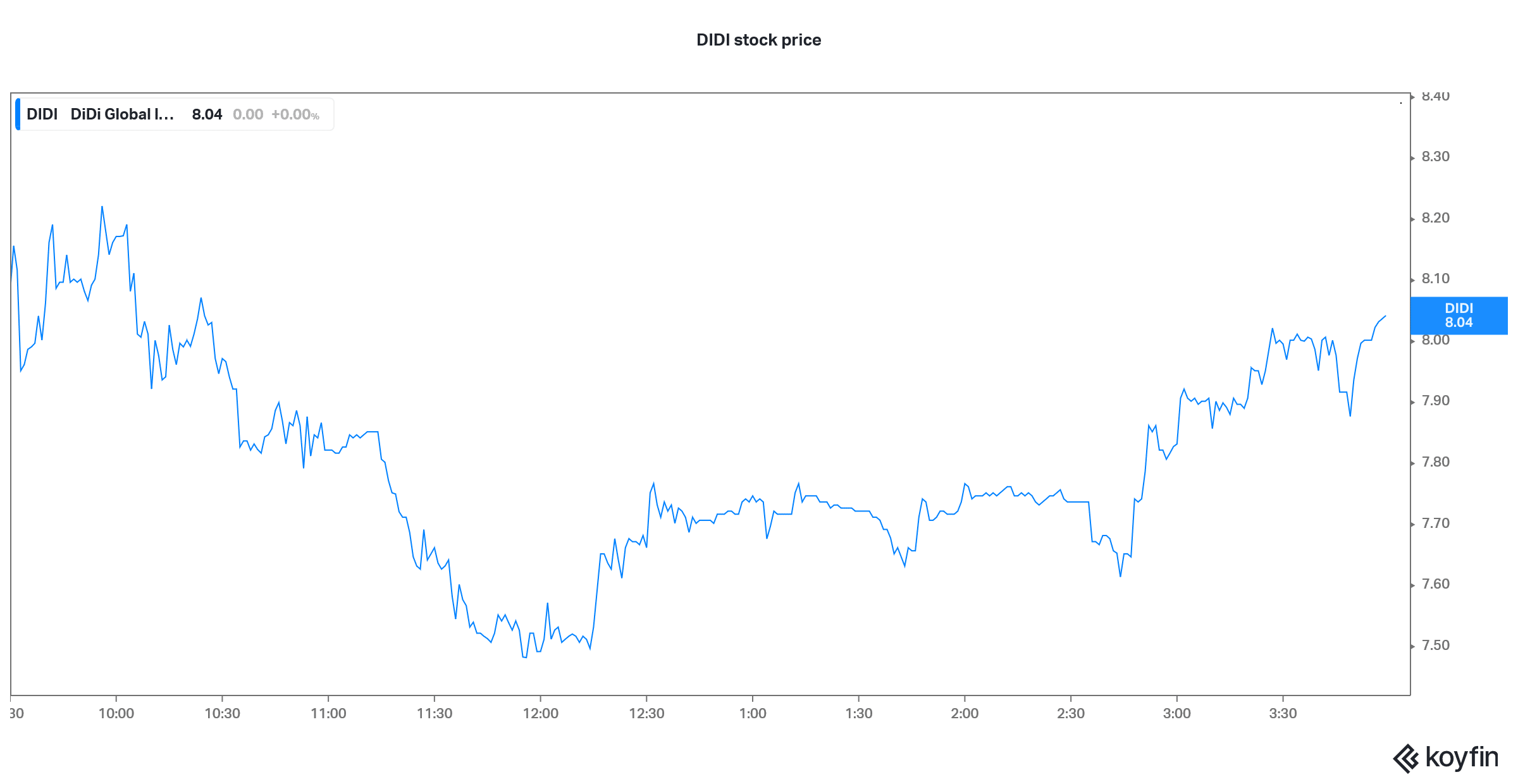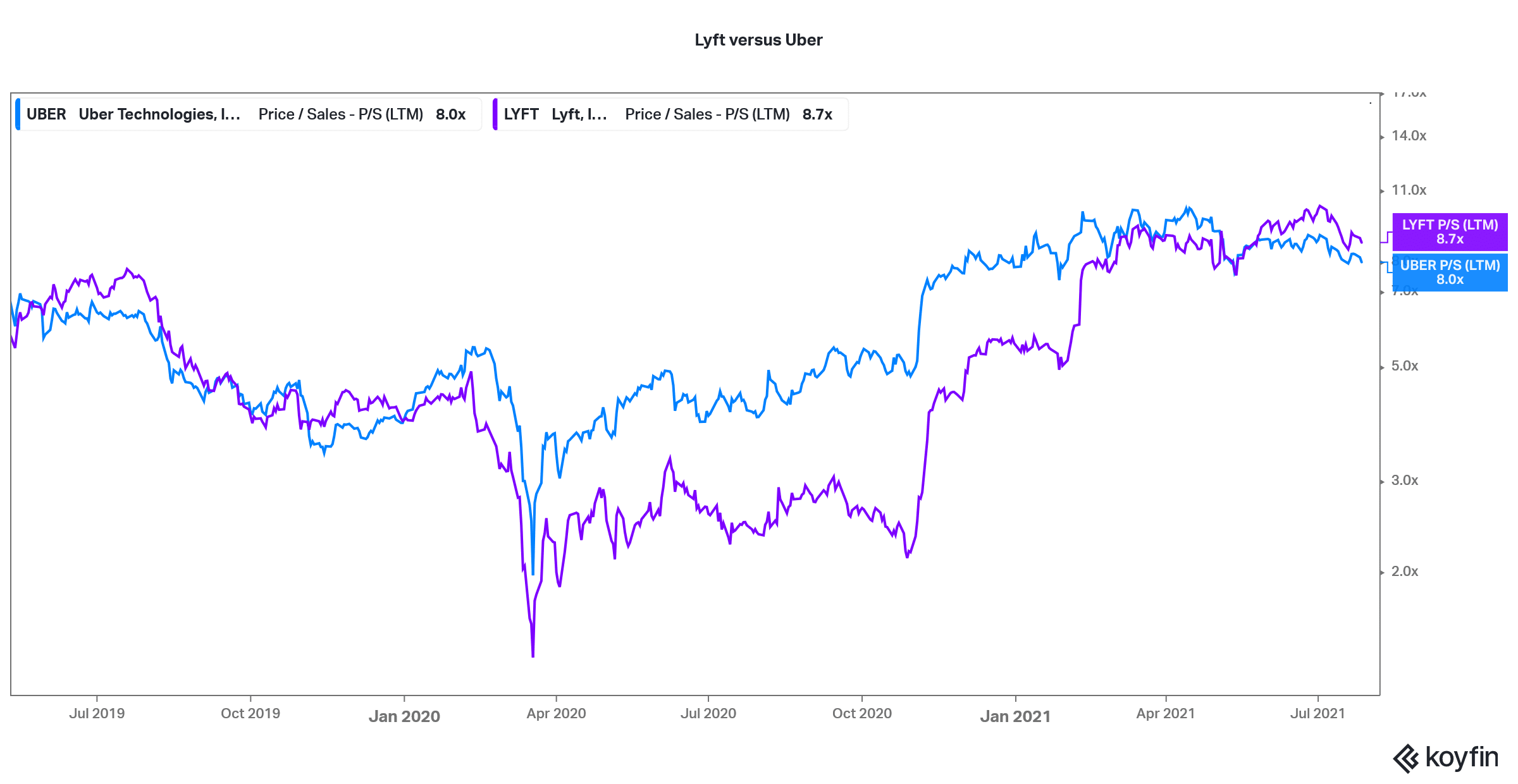Didi Global Stock Price Falls 42% – Time to Buy DIDI Stock?
Please note that we are not authorised to provide any investment advice. The content on this page is for information purposes only.
Didi Global stock went public last month and has since been in freefall amid China’s tech crackdown. The stock is down 42% from the IPO price of $14. Should you buy the dip in DIDI stock?
Even before China’s crackdown, DIDI stock had a dismal listing. The IPO opened at $16.65 which was 19% higher than the ADR issue price. It went on to hit a high of $18.01 but has since seen a massive sell-off. The stock hit its all-time low of $7.16 but has since crossed above $8. DIDI was trading higher in US premarket price action as investors seem to be finding value in the beaten-down stock. Several other Chinese stocks including Alibaba which hit its 52-week low yesterday, are also trading higher today.
DIDI stock technical analysis

Since DIDI stock was listed only about a month back we don’t have a lot of technical data points. Technical analysis relies on time series data and we only have only a month of price performance for the Chinese ride-hailing app. That said, the stock trades below the 10-day SMA (simple moving average). However, the 14-day RSI (relative strength index) of 30.17 indicates oversold positions. RSI values below $30 signal oversold positions while values above 70 signal overbought positions.
67% of all retail investor accounts lose money when trading CFDs with this provider
Recent developments
China has targeted DIDI and banned the new downloads of its app in the country. While the company is present in several other markets, it gets most of its revenues from China which is its home market. Meanwhile, China is reportedly considering a massive fine on Didi. The country imposed a record $2.8 billion fine on Alibaba earlier this year after an antitrust probe. The country had also blocked the IPO of Ant Financial which is backed by Alibaba. Ant was set to become the biggest IPO ever surpassing the record previously held by Alibaba. The fintech company received bids worth $3 trillion and would have commanded a market cap higher than JPMorgan Chase, the largest US bank.
DIDI regulatory troubles
To be sure, DIDI’s regulatory woes were known even before the IPO even as the markets did not believe that things would get this worse. The company said in its IPO filings that “We cannot assure you that the regulatory authorities will be satisfied with our self-inspection results or that we will not be subject to any penalty with respect to any violations of anti-monopoly, anti-unfair competition, pricing, advertisement, privacy protection, food safety, product quality, tax and other related laws and regulations.” The ride-hailing company warned of troubles ahead and added, “We expect that these areas will receive greater and continued attention and scrutiny from regulators and the general public going forward.”
Analyst ratings
Since DIDI was recently listed not many analysts are currently covering it. Also, given the regulatory uncertainty, not many brokerages would be willing to give calls on the troubled company. Atlantic Equities, which has a buy rating on the stock downgraded it to hold amid the crackdown and lowered the target price to $12. The target price implies an upside of almost 50% over yesterday’s closing prices but the brokerage warned of volatility ahead.
“While we believe the most likely outcome will be manageable financial and operational penalties, the range of outcomes leaves us unable to recommend the stock until there is more certainty,” said Atlantic Equities’ analyst Xiao Ai. He also expressed concern over the ban on new app downloads as it could hurt the market share gains. “A significant premium comes with having a monopoly in ridehailing and hence there would not be a linear relationship between market share lost and the impact on valuation,” he said in his note. DIDI had also said that the ban on new app downloads will impact it financially.
Should you buy DIDI stock now?
China is particularly concerned about the massive data of Chinese users that DIDI has. Earlier this year, the country had also banned Tesla cars from military facilities over spying concerns. Tesla had denied any concerns over spying.
From a valuation perspective, all Chinese companies, especially those listed in the US markets, are in for a valuation multiple contraction. DIDI has a market cap of just about $39 billion which is way below the $62 billion that it commanded in the most recent private market transaction. While many were expecting the Chinese ride-hailing app to command a market cap of $100 billion, China’s crackdown has changed the outlook.

Valuation
The company generated revenues of $21.6 billion in 2020 and currently trades at 2020 price-to-sales multiple of 1.8x. To put that in perspective, Uber trades at an LTM (last-12 months) price-to-sales multiple of 8x while Lyft trades at 8.7x.
Meanwhile, the valuation gap between the US and Chinese companies is set to see a structural change amid China’s crackdown. Alibaba’s valuation discount to Amazon has also widened over the last couple of months. While Alibaba is trading near 52-week lows, Amazon is trading near record highs. Amazon’s third-quarter earnings release that is scheduled for tomorrow could take the stock even higher.
All said the sell-off in DIDI stock looks overdone now even as there is a lot of uncertainty on how China would target the company. It could be a risk worth taking in DIDI stock now after the massive crash. Ultimately, it’s a great time to buy stocks and invest in Didi.
DIDI stock was trading over 3% higher in US premarket price action today as bargain hunters seem to be finding value in this beaten-down name.
67% of all retail investor accounts lose money when trading CFDs with this provider





